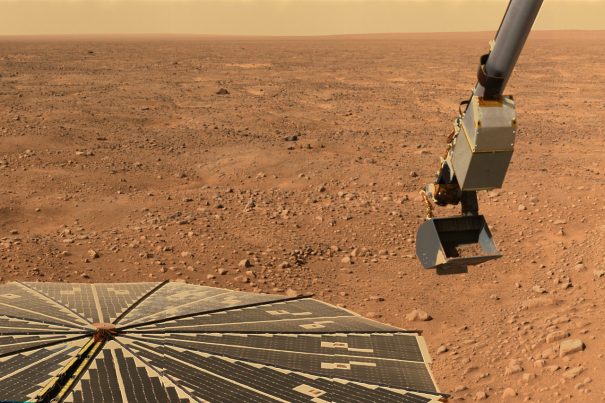
The search for life on Mars by the ESA reaches important milestone as ExoMars Rover prepares for its “shake and bake”
Wednesday, June 27, 2018 by Edsel Cook
http://www.ufos.news/2018-06-27-the-search-for-life-on-mars-by-the-esa-reaches-important-milestone.html

The prototype of the ExoMars Rover is being prepared for vibration and temperature tests in France. The upcoming “shake and bake” test is a big step for the European Space Agency’s mission to seek out any form of life on Mars, an article on Reuters states.
The Structural Thermal Model was recently completed in Stevenage, a town north of London which has been dubbed the “Space City” of Britain. The Airbus-built prototype will be shipped across the Channel to Toulouse, where it will undergo a battery of evaluations. Any improvements will go into the full-sized rover.
A joint project with Russian space agency Roscosmos, ExoMars will visit the Red Planet in 2020. If successful, it would be the first European rover to safely touch down on Mars.
The last attempt by the ESA to put a vehicle down on the Red Planet took place in 2016. Ground control lost contact with the Schiaparelli module shortly before it reached the surface. An overflight by a NASA space probe showed the wreckage of the Italian-built lander.
NASA has already put several rovers on Mars. One of them, the near-unstoppable Curiosity, is still running as of June 2018. (Related: Mars discovery almost certainly proves life exists on other planets.)
Prototype ESA rover carries “huge” drill to look for Martian life underground
The ExoMars Rover will feature greater sophistication than its predecessor Schiaparelli. It will be able to navigate by itself and is equipped with an exploration drill that is as long as a man is tall.
ExoMars official Abbie Hutty called the two-meter-long drill the most exciting part of ExoMars. The huge tool can dig deep into the crust, the likeliest place to find any surviving Martian lifeforms.
Conditions on the Martian surface are too hostile for life. There could be underground fissures that are shielded from surface radiation by several layers of rock. If such a fissure happens to contain water deposits, it would be a comfortable environment for simple life forms like microbes.
Hutty will watch over the tests in Toulouse, where the Structural Thermal Model will simulate the shaking conditions aboard the Russian-built Proton rocket that will hurl it towards Mars. The Toulouse facility will also simulate the harsh changes in temperatures on the planet.
Meanwhile, researchers are browsing images taken by the ESA’s Mars Express satellite. They are currently picking the best landing spot for the aeroshell that will safely deliver the ExoMars Rover to the surface.
European rover will be able to drive by itself, climb rocks, and cross deep sand
The autonomous navigation system is already being evaluated at the Mars Yard facility of ExoMars manufacturer Airbus Defence and Space. It will enable the ESA rover to drive itself instead of relying on instructions from Earth that will take 24 minutes to reach Mars.
Stevenage will handle terrain tests. The space center there has a special driving range that looks like it had been carted over from Mars. The only things missing are the higher levels of radiation and the weaker gravity.
The wheels of the ExoMars Rover are made of slim metal strips that can match the grip and traction of rubber wheels without running the risk of contaminating Mars with terrestrial organics. Paired with a special suspension system, these “wafer wheels” will give the rover the ability to climb over rocks and dig into the deep sand of Mars.
The results of the Toulouse tests will go into the final rover. Airbus will build two units, one of which will be sent to Mars while the other stays in Stevenage for testing.
You can browse more articles about future missions to Mars at Space.news.
Sources include:
Tagged Under: Tags: ESA, evidence of life on Mars, ExoMars, ExoMars Rover, Life on Mars, Mars, Mars exploration, Mars missions, mars rover, Mars surface, Space, space travel





